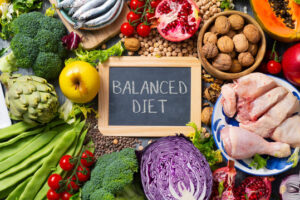Introduction
In a world inundated with diet trends and nutritional advice, finding a balanced approach to eating can be challenging. A balanced diet is essential not only for maintaining a healthy weight but also for ensuring overall well-being. This guide will explore the fundamentals of a balanced diet, debunk common myths, and provide practical tips for making healthier food choices.

What is a Balanced Diet?
A balanced diet includes a variety of foods in the right proportions to provide the body with essential nutrients: carbohydrates, proteins, fats, vitamins, and minerals. Here’s a breakdown of the key components:
-
Carbohydrates:
These are the body’s main energy source. Opt for complex carbohydrates found in whole grains, vegetables, and fruits over simple sugars and refined grains.
- Proteins: Essential for growth, repair, and maintenance of tissues. Incorporate lean meats, fish, eggs, legumes, and nuts.
- Fats: Necessary for brain health and energy. Focus on healthy fats from avocados, nuts, seeds, and olive oil while limiting saturated and trans fats.
-
Vitamins and Minerals: Crucial for various bodily functions. Ensure a colorful plate with a variety of fruits and vegetables.
- Fiber: Aids in digestion and can be found in whole grains, fruits, vegetables, and legumes.
- Hydration: Water is vital for all bodily functions. Aim for at least 8 glasses a day.
The MyPlate Model
The MyPlate model, created by the USDA, is a straightforward visual guide to help you balance your meals. It divides a plate into four sections:
– Fruits: One quarter
– Vegetables: One quarter
– Grains: One quarter (preferably whole grains)
– Protein: One quarter
A small circle beside the plate represents dairy, emphasizing the importance of including a serving of dairy or dairy alternativeshttps://yubloger.com/
Debunking Common Diet Myths
- Myth: Carbs are bad for you.
– Reality: Not all carbs are created equal. Whole grains and vegetables provide essential nutrients and energy.
- Myth: Fat makes you fat.
– Reality: Healthy fats are vital for health. It’s the type and amount of fat that matters.
- Myth: Skipping meals helps with weight loss.
– Reality: Skipping meals can lead to overeating later and disrupt your metabolism.
- Myth: You need supplements to get all nutrients.
– Reality: Most people can get all the nutrients they need from a balanced diet. Supplements should only be used when necessary and prescribed by a healthcare professional.
Practical Tips for a Balanced Diet
- Plan Your Meals: Prepare a weekly meal plan to ensure you include all food groups.
- Portion Control: Be mindful of portion sizes to avoid overeating.
- Snack Smart: Choose healthy snacks like fruits, nuts, and yogurt.
- Cook at Home: Home-cooked meals are often healthier and allow you to control ingredients.
- Stay Hydrated: Drink water throughout the day and limit sugary drinks.
- Mindful Eating: Eat slowly and savor your food. Listen to your body’s hunger and fullness cues.
Sample Balanced Diet Plan
Breakfast
– Oatmeal topped with fresh berries and a drizzle of honey
– A glass of low-fat milk
Mid-Morning Snack
– A handful of almonds
Lunch
– Grilled chicken salad with a variety of colorful vegetables, quinoa, and a light vinaigrette
– A serving of fruit
Afternoon Snack
– Carrot sticks with hummus
Dinner
– Baked salmon
– Steamed broccoli
– Brown rice
Evening Snack
– A piece of dark chocolate or a small bowl of Greek yogurt with a sprinkle of nuts
Conclusion
Adopting a balanced diet is about making sustainable and enjoyable food choices that nourish your body and support your overall health.
By understanding the essential components of a balanced diet, debunking common myths, and implementing practical tips, you can create a healthier and happier lifestyle. Remember, moderation and variety are key.
Enjoy your meals, make informed choices, and take the journey to better health one step at a time.

No Responses